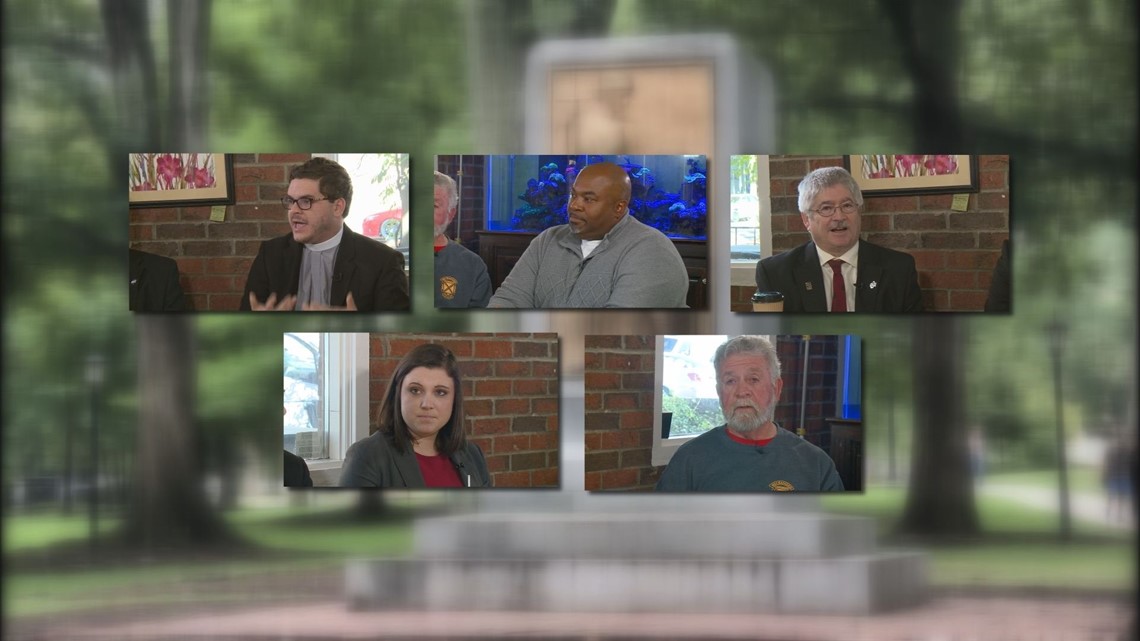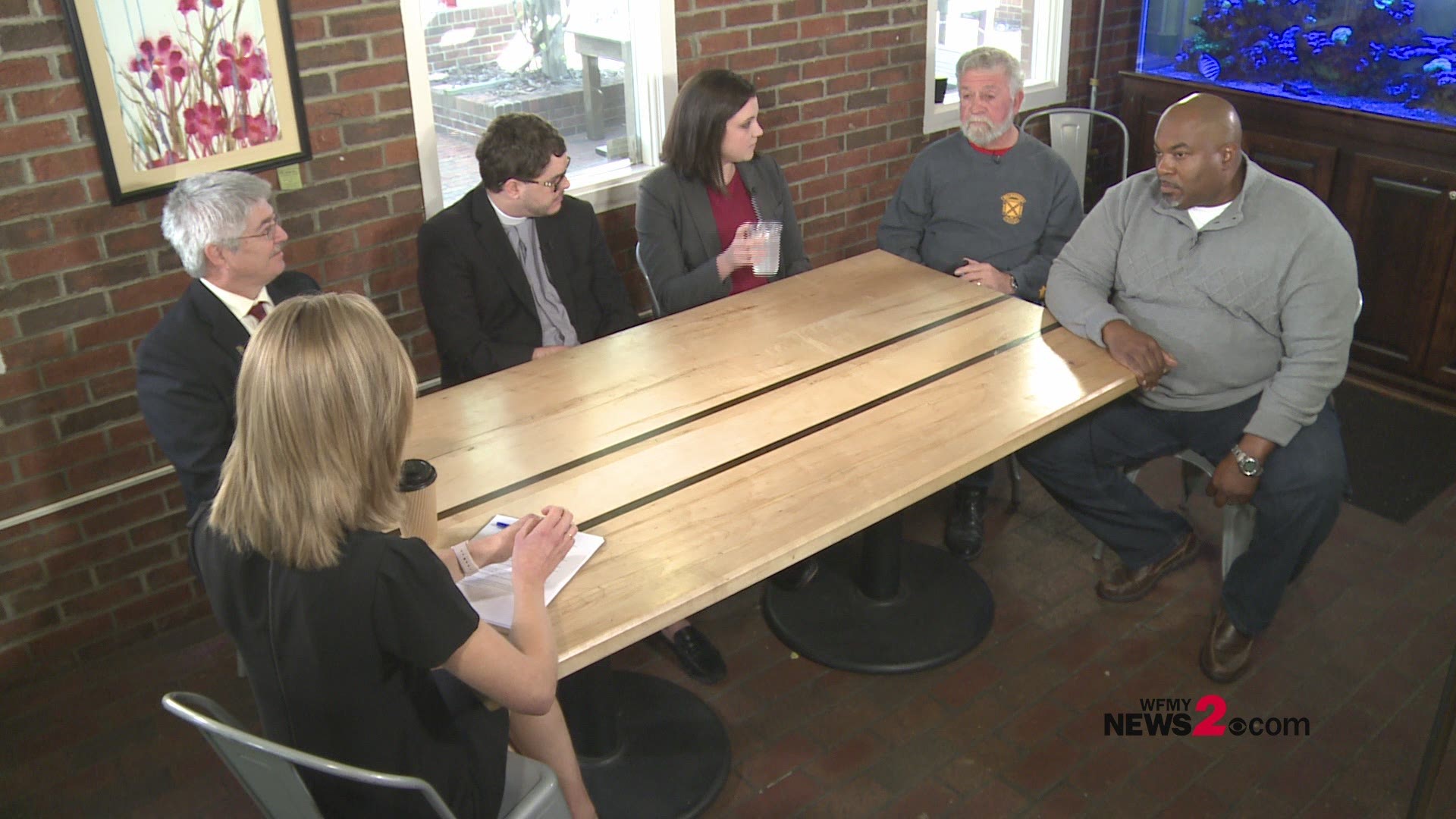GREENSBORO, NC -- It's one of the most debated issues in our state: what to do with Confederate Monuments. The statues have led to heated protests, arrests and even violence over the years. WFMY News 2's Maddie Gardner sat down with five of your neighbors, who have five very different opinions.


The Panelists:
Reverend Rob Wright Lee IV is a pastor in Forsyth County and the nephew, generations removed, of Confederate General Robert E. Lee. He is also an instructor at Appalachian State University.
Mark Robinson is a lifelong resident of Greensboro and a conservative political commentator.
Dr. Charles Bolton is a historian of the U.S. South at the University of North Carolina at Greensboro. He is the associate dean in the College of Arts and Sciences there.
Grace Lempp is a law student at the University of North Carolina at Chapel Hill and is from Greensboro.
Bill Starnes is a member of the Sons of Confederate Veterans from Gaston County.
ROUNDTABLE: CONFEDERATE CONFLICT: A CANDID CONVERSATION
Maddie Gardner: My first question is Is there a cut and dry easy answer to this?
Grace Lempp: I don't think so. I know it's complicated.
Bill Starnes: I think it's pretty cut and dry and to me is very simple. If our education system would teach the true history in that time period nobody would have a problem with those monuments and symbols.
Rob Lee: I would disagree. I think it's a little less cut and dry and a little more gray in that area. I look at it this way. General Robert E. Lee himself in a letter in 1870, right before he died, felt that there should not be statues erected to him or to his cause because it would continue the feelings engendered.
Mark Robinson: They should stand as a reminder of that period and the period that came after it. You can't teach people history by erasing - we have to leave it up and we have to let people learn from it.
Maddie Gardner :So we're talking about history right now so I want to bring Dr. Bolton in to give us historical context here because these statues were put up really in the early nineteen hundreds - most of them. But the Civil War ended before that.
Charles Bolton: So there are really two periods when they were mainly put up starting in 1890 through the first couple decades of the 20th century and then in the 1950s and early 1960s. And I do believe that they were put up partly because there is one reason they weren't put up right after the war suggests that maybe they weren't just about memorializing Confederate soldiers
Maddie Gardner: Which raises my next question which is what do these monuments represent to you?
Bill Starnes: To me they represent grave markers to a large extent because so many Confederate soldiers are buried in mass graves and unknown graves and stuff like that.
Grace Lempp: I think they represent the monuments represent the priorities of people in power in our state. [sic] People that definitely identify with everything you're saying and I think a lot of what you're saying as well. I just don't necessarily agree that these statues mean that to every person. I think that to some people the idea that heritage not hate the Confederacy represents more than the defense of slavery. I'm just not sure I buy into that.
Mark Robinson: To me they represent our history and we shouldn't be ashamed of our history and I don't understand why people are ashamed of our history. [sic] Those statues I believe should stand there so I can take my grandson to them and show him and say hey once upon a time there were people in this country that to believe we should be owned.
Charles Bolton: Why not take him to the museum?
Rob Lee: It should not be in a public square.
Mark Robinson:They should leave it right where it is and tell everybody the history and let them decide for themselves. Because I'm telling you, if you start tearing down monuments and everything, eventually we're going to get to a monument that one of you all hold dear - and then what? Because somebody else is offended by it.
Rob Lee: I look at it this way with with with regards to statues - that I do have a vested interest in this with someone being my collateral ancestor who actually had something to say about this - I look at it this way, they are idols and as a pastor it is clear to me what you do with idols, you tear them down, you take them down because they have becomes idols of white supremacy and of hate.
Maddie Gardner: I want to ask if it's what you think about this. The Historical Commission just ruled that Confederate Monuments, specifically on our State Capitol grounds, should stay where they are but there should be context added to them and there should also be monuments put up that represent African-Americans and other underrepresented groups in our state.
Grace Lempp: I think having the context there helps. I think adding other statues that represent underrepresented people - I think that's a start because while I know my beliefs and I believe that these statues should be taken down, I also know that my beliefs don't represent everyone in the state. So I think that's a good start.
Charles Bolton: One thing that's kind of ratcheted up thing everything is the 2015 law that the legislature passed which they basically took away the power of local communities to kind of discuss these issues and decide what they want to do. [sic] I do think this is a local issue and people should discuss it you know to discuss and talk about it see where they want to move as a community but that's really been cut off because they said you can't move these or do anything with them you know unless you go to the Historical Commission.
Bill Starnes: I don't have any problem with added context or other statues or monuments whatever they want to add - that's fine with me- I mean that's called freedom. And we are supposed to be a free country.
Maddie Gardner: Would Adding context these monuments be enough for you Reverend Lee?
Rob Lee: I think context is important especially when it comes to the Confederate dead but even then I'm a little skeptical because in Europe you don't see monuments to the fascists and you don't see monuments to the losers. You don't see monuments to the traitors. [sic] And that is what bothers me about context I mean I think when their on the state grounds - I look at it this way, you know you know it may not bother me as a white cis-gender male that you know, I'm walking by that statue and I see it and it doesn't bother me. But my confirmation mentor is a woman of color and she told me the last time we walked by that monument that it really bothered her because it was an infringement upon her ability to vote. It had been for a long time. She's older.
Bill Starnes: It is not.
Rob Lee: Can I finish? She was old enough to remember a time when she couldn't vote because of those laws that were in place and she sees these statues as remnants of that past. And when we look at it that way it's not a question for me because it becomes empathy and it becomes education.
Mark Robinson: Okay, so I'm a person of color and I disagree with your friend.
Rob Lee: That's fair.
Mark Robinson: So do you take my point of view into consideration as well?
Rob Lee: I do - I respect it.
Mark Robinson:Because my my point of view is when I walk past those statues one thing I'm most thankful for, I'm thankful that my mom and daddy raised somebody who's not weak enough to have their feelings hurt by a hunk of stone.
Rob Lee: Don't you dare call people weak for having empathy and feeling that way.
Mark Robinson: And I'm saying that because I'm highly offended about the fact that you say that about people of color as if we are all one monolithic train of thought.
Grace Lempp: I don't think he was suggesting that at all.
Mark Robinson: Okay. If that's not what you were suggesting then I'll take you at your word but that's how I took it. If it's not what you meant, then I apologize. But it is how I took it.
Rob Lee: Context is everything and I think what happened here is I suggested that a woman of color was offended by the statue. [sic] So what you can't tell me, regardless of the color of your skin, is that me experiences of these women of color are any different from they felt and how they feel today.
Mark Robinson: Well here's my opinion on the state house thing first off - my opinion on the state house thing is this as far as public grounds like the state house where people are going to pay bills and go to court and that thing. I think they should be sanitized.
Maddie Gardner: And you mean no monuments on state capitol grounds?
Mark Robinson: Maybe no monuments at all. If you start off it's going to hurt people's feelings just don't have any monuments there. Oh if it's truly going to hurt people's feelings. Now if I was making the decision would I leave the statues there? Absolutely I'd leave them there.
Maddie Gardner: My final question here. There are five opinions - five different opinions - at this table. They certainly don't represent all opinions in our state. Is there a compromise? Is there a way to bring every opinion together on this issue?
Grace Lempp: I think that's the most important goal here. Because. Like we've said we're more polarized on this issue and the state's polarized on this issue.
Bill Starnes: I believe that the compromises is what we're doing today. [sic] What we have to do is continue doing these things sit down and find some common ground some areas that we are bound to be areas that we agree on. And my biggest thing is we have to educate about the true history of that time period.
Maddie Gardner: So let me ask you. Do you think you learned anything today from this Conversation? Was your opinion in any way changed or your eyes opened to something else?
Bill Starnes: My opinion has not changed one bit because my opinion is based on true history actual true history.
Maddie Gardner: Is there a compromise Reverend Lee?
Rob Lee: I hope so. I haven't seen one yet but I really hope so. I think what we fixate on is is this idea of the other. The idea that just because my skin is one way or their skin is the other or we think differently about flags or monuments or whatever that we have to be distant from one another. Well I hope that we can come together and at least have a conversation like we've done today. Even if there is disagreement I believe that we can find hope in the fact that we're still talking because there are plenty of countries across this world that are still talking and we see what's happening in those places. So it is my hope and prayer that even in disagreement we might find some sense of unity.
Charles Bolton: I would also hope so. I as a historian I also hope that people do learn more about the history surrounding these events and the context.

